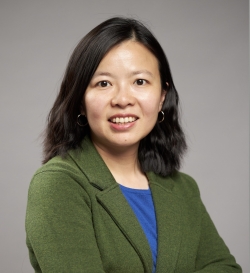
The past 50 years has seen a dramatic increase in the amount of compute per person, in particular, those enabled by AI. Despite the positive societal benefits, AI technologies come with significant environmental implications. I will talk about the scaling trend and the carbon footprint of AI computing by examining the model development cycle, spanning data, algorithms, and system hardware. At the same time, we will consider the life cycle of system hardware from the perspective of hardware architectures and manufacturing technologies. I will highlight key efficiency optimization opportunities for cutting-edge AI technologies, from deep learning recommendation models to multi-modal generative AI tasks. To scale AI sustainably, we need to make AI and computing, more broadly, efficient and flexible. We must also go beyond efficiency and optimize across the life cycle of computing infrastructures, from hardware manufacturing to datacenter operation and end-of-life processing for the hardware. Based on the industry experience and lessons learned, my talk will conclude with important development and research directions to advance the field of computing in an environmentally-responsible and sustainable manner.
Bio: Carole-Jean Wu is a Director of Research Science at Meta. She is a founding member and a Vice President of MLCommons – a non-profit organization that aims to accelerate machine learning for the benefits of all. Dr. Wu also serves on the MLCommons Board as a Director, chaired the MLPerf Recommendation Benchmark Advisory Board, and co-chaired for MLPerf Inference. Prior to Meta/Facebook, She was a professor at ASU. She earned her M.A. and Ph.D. from Princeton and B.Sc. from Cornell.
Dr. Wu's expertise sits at the intersection of computer architecture and machine learning. Her work spans across datacenter infrastructures and edge systems, such as developing energy- and memory-efficient systems and microarchitectures, optimizing systems for machine learning execution at-scale, and designing learning-based approaches for system design and optimization. Dr. Wu's work has been recognized with several awards, including IEEE Micro Top Picks and ACM/IEEE Best Paper Awards. She was the Program Co-Chair of the Conference on Machine Learning and Systems (MLSys) in 2022, the Program Chair of the IEEE International Symposium on Workload Characterization (IISWC) in 2018, and the Editor for the IEEE MICRO Special Issue on Environmentally Sustainable Computing. She currently serves on the ACM SIGARCH/SIGMICRO CARES committee.
Cosponsored by the Department of Electrical and Computer Engineering and the Department of Computer Science
To request accommodations for a disability please contact Donna Ghilino, dg3548@princeton.edu, at least one week prior to the event.